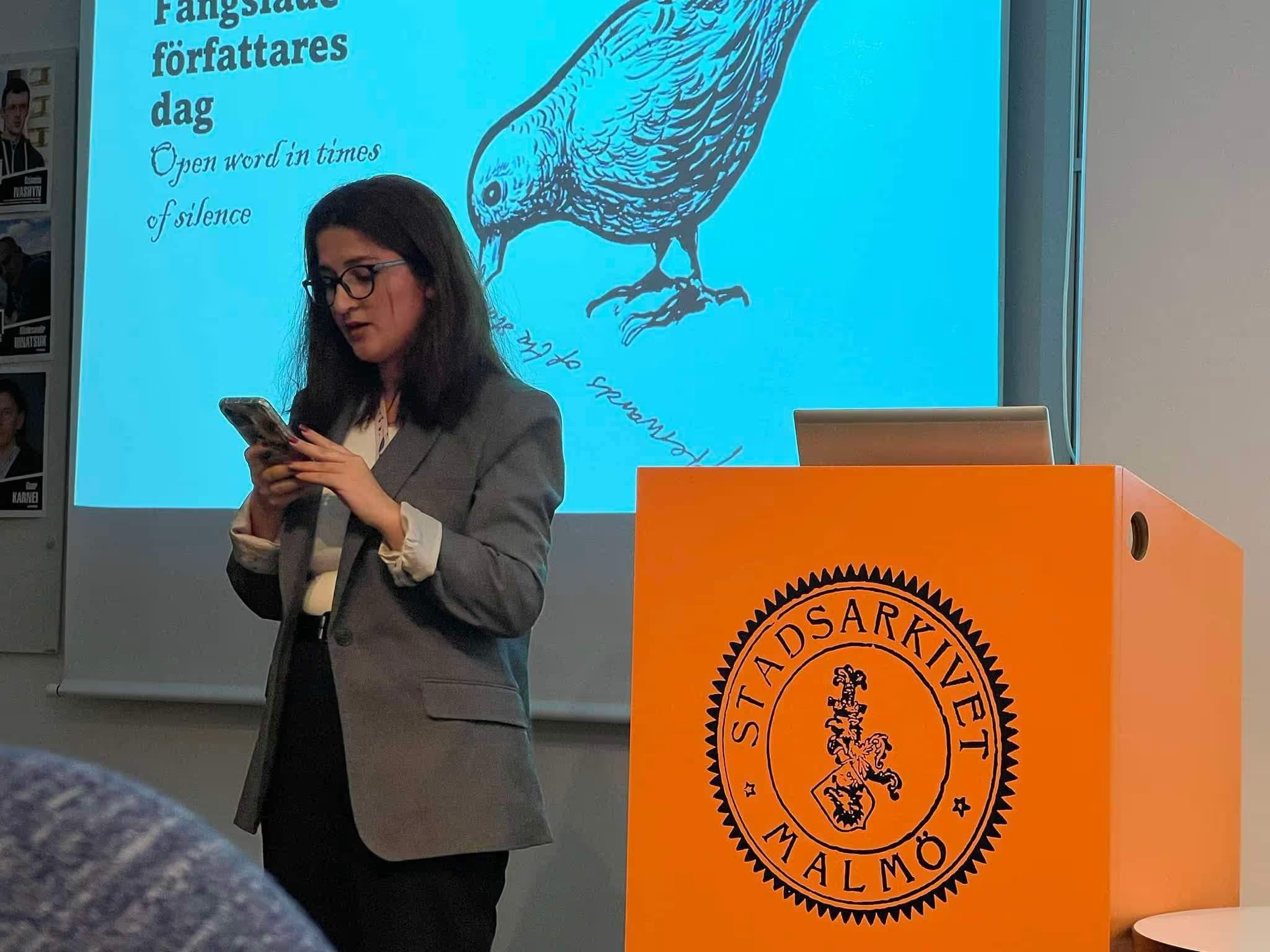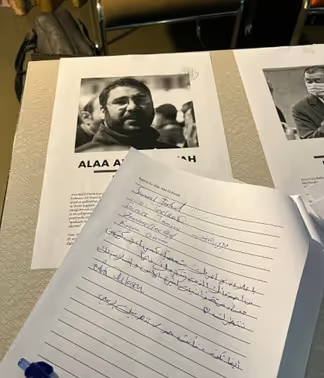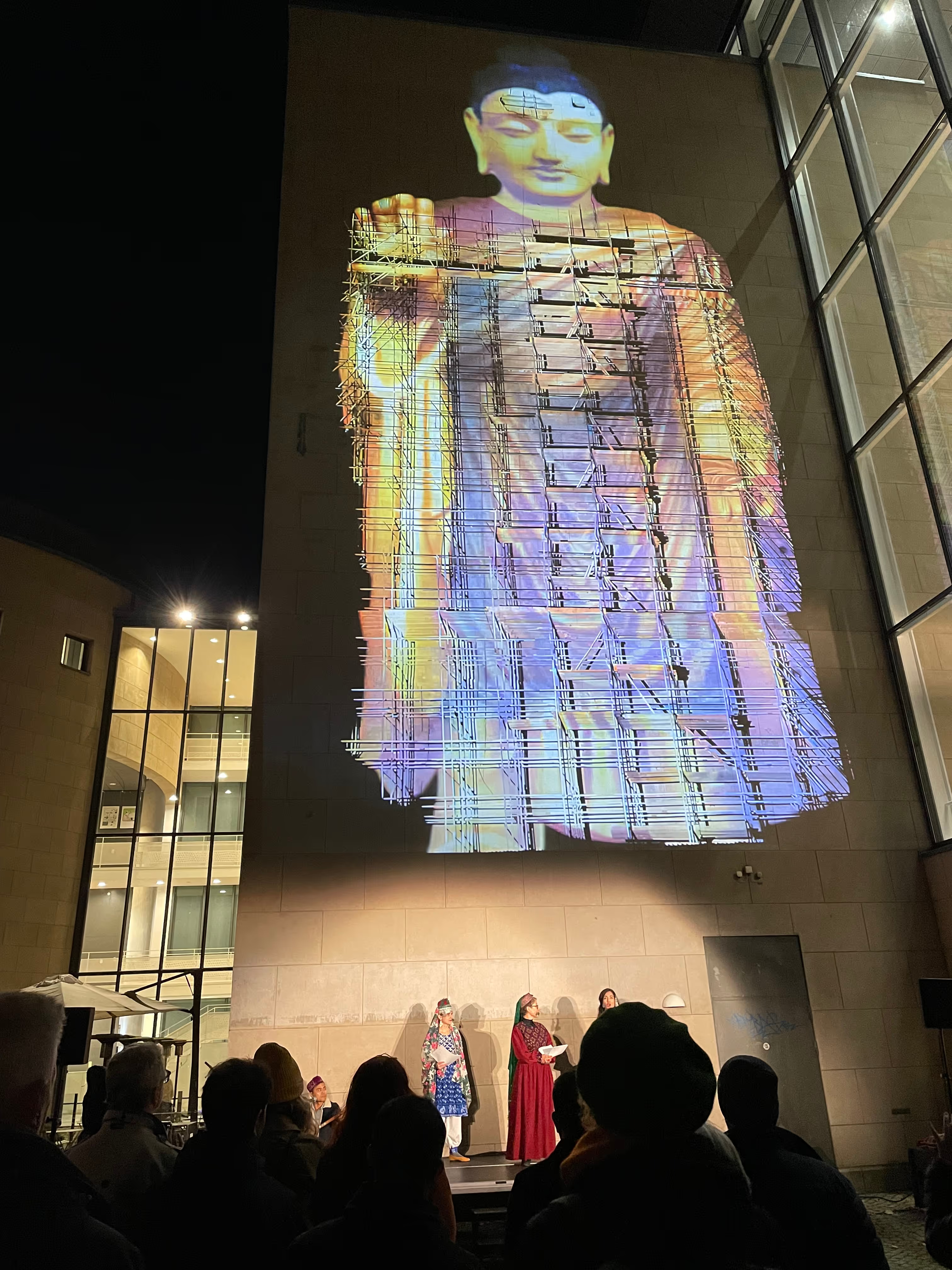In Malmö: Celebrating the Written Word, Honouring the Silenced

On 15 November each year, the Day of the Imprisoned Writer is observed to highlight the situation of imprisoned writers, protect freedom of expression, and protest against its oppressors. On this day PEN centres around the world and their partner organisations, including ICORN, recognise the writers who have been threatened, harassed, imprisoned, or killed because of their work.
Led by PEN International, freedom of expression organisations use the day to call for the release of imprisoned writers. Advocacy campaigns often include petitions, letter-writing, and public demonstrations to pressure authorities to free detained writers or drop charges against them. The day also serves to commemorate writers who were killed in the past year due to their profession.
This year, a number of writers and journalists in ICORN residencies participated in an event titled ‘Open Word in Times of Silence’ at the Malmö City Archives, and organised by PEN Sweden, in collaboration with Dawit Isaak Library. This solidarity night honoured imprisoned writers and celebrated freedom of expression.
The event included readings where writers,including Mizar Kemal, Hêlan Çiya, Parvin Ardalan, Azhar Al-Rubaie, shared their own works and those of others, highlighting the importance of literature in challenging oppression.
In the readings event, writers shared their own works and those of others, highlighting the importance of literature in challenging oppression.
During the coffee break, a small bazaar offered handicrafts made by imprisoned women in Iran, providing attendees the opportunity to support the women’s cause by purchasing the items at a voluntary price. The funds raised would be returned to the women to aid them during their imprisonment.

Mizar Kemal, a writer and journalist from Iraq and former ICORN resident in Stockholm, who attended the event said:
‘To show support, I bought two dolls were made by female prisoners in Iran, using a thread and a leather bag, and they will now become part of my personal belongings. It has a high human value to possess this craft made by a trembling hand in harsh prisons. These are priceless things, no price can be equivalent to the time of women who did not surrender and risked everything, their lives, to create this beauty.’
Kemal emphasised that the event was one of the most impressive literary evenings for him, not only because he thought the poems and texts were beautiful, but also because of the theme and the message they conveyed. Kemal added:
‘It is not often that we listen to poems written by poets who died after spending their entire lives in prison, nor is it often,for me, to write letters to imprisoned writers, knowing that those letters may not ever arrive, yet I write them as if they will reach them now.’

Parvin Ardalan, Iranian writer, journalist,activist and Malmö’s first ICORN resident, who co-organised the ‘Open Word in Times of Silence’, said:
‘Recently, some friends, families of prisoners, and former prisoners have formed working groups to sell these handmade products created by imprisoned women. One such group, which maintains contact with political and ordinary women prisoners in Evin Prison, Tehran, and in Semnan, sent us some of their crafts which were showcased on 15 November. The proceeds from the sales will be sent to the prisoners, both as compensation for their efforts in creating these works and as a reminder that they are not forgotten. ‘
Ardalan continued:
‘During the event, we invited PEN Skåne’s members, including those who have experienced enforced silence, to join the solidarity event and read from their own works and those of writers currently in prison as we signed the call for Alaa Abd El-Fattah, Katsyaryna Andreeva, and Jimmy Lai. We sent the news of the event to their families to let them know that they have not been forgotten.’
Contributing authors who read their works were Ángela Inés García Castrillon, Azhar Al-Rubaie, Fairooz Tamimi, Hêlan Çiya, Ida Börjel, Naeimeh Doostdar, Sara Afrasiyabi. They raised the voice of others, from Belarus to Gaza, from Iraq to Iran, highlighting ongoing wars, conflicts, and other forms of violence threatening free expression.

Jude Dibia, writer and ICORN coordinator in Malmö said:
‘The event highlights the plight of writers,journalists, and other literary professionals who are imprisoned or otherwise silence due to their work. By sharing their stories, the day draws attention to the broader issue of censorship and the suppression of free speech globally. Through these efforts, the day not only sheds light on individual cases, but also reinforces the importance of safeguarding free expression as a cornerstone of democratic societies.’
Written by Azhar Al-Rubaie.
Malmö celebrates two weeks of Forbidden Culture & Banned Books
Prior to the Day of the Imprisoned Writer, Malmö, as one of the 25 ICORN Cities of Refuge in Sweden,hosted numerous activities celebrating freedom of expression and cultural diversity. October in Malmö offered vibrant cultural events, exhibitions, book launches, and lively forums on hot topics aimed at the residents and guests of Sweden’s third-largest city.
For the second year in a row, the Dawit Isaak Library in Malmö organised Sweden’s Banned Books Week, in collaboration with Swedish PEN. The event originated in the USA as a response to the growing challenges of distributing literature in schools, libraries, and book shops, the Banned Books Week returned to Malmö after its successful debut in 2023. The week ran from 7 to 13 October 2024 and it opened with the launch of journalist Ida Ölmedal’s new book Where You Burn Books at Malmö City Library. Ölmedal was joined in conversation by Ebba Berg and Karin Salmson, moderated by Anders Mildner. Poet Amir-Hossein Massaebi also shared readings of his work.
Throughout Banned Books Week, the programme included a seminar on banned Iranian literature, featuring writers, artists, translators, singers,researchers, journalists, and activists from Iran, Germany, and Sweden. Seminars on censorship took place in Lund, and marathons of banned book readings and displays of taboo objects were held in local museums.
Following this, Forbidden Culture Week kicked off on 14 October,highlighting artistic freedom and censorship across cultures. The programme was organised by the City of Malmö and included art and literature which had, at some point, faced censorship and prohibition. The week opened with a public event at Inkonst and was opened to the public free of charge.

Highlights from the Forbidden Culture Week included the announcement of the winners of a writing competition held by Malmö ICORN City of Refuge, the installation ‘A Night with Buddha: Echoes of Silence’, and talks on topics such as ‘Cultural Heritage in War and Disaster’. Other notable sessions featured ‘Writer’s Scene’ with Lyudmila Ulitskaya in conversation with Morris Wikström, ‘Aesthetics of Liberation’, with Arif Arslan, Hêlan Çiya, Johanna Bratel, and Hiram Li, and ‘Cultural Work in Conflict Zones' with speakers Khaled Harara, Mohammed El-Susi, Yasmine El-Baramawy, and Fredrik Elg.
Written by Jude Dibia.



